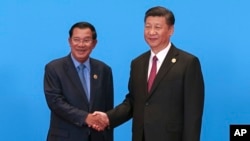Prime Minister Hun Sen has congratulated Chinese President Xi Jinping on his reelection as Communist Party secretary general amid a crackdown on dissent in Cambodia that has received the vocal support of Beijing.
In a letter dated October 25, Hun Sen told Xi that his “reelection reflects that the central committee members of the Communist Party of China and the Chinese people have renewed their resolute and full confidence in your leadership in the new era.”
“I strongly believe that the long-lasting friendship and cooperation between the Cambodian People’s Party and Communist Party of China will be further strengthened and developed for the mutual benefit of our two nations and people,” he wrote.
Phay Siphan, government spokesman, said: “We believe good relations between Cambodia and China on the economy will surely grow,” adding that “no-one can separate Cambodia from China or China from Cambodia and any obstacles Cambodia faces are also China’s”.
Xi told Hun Sen during a meeting in May that the country’s relations were experiencing “sound development momentum” and would seek to strengthen relations further ahead of the 60th anniversary of diplomatic ties next year.
Last October Xi visited Cambodia and signed more than 30 agreements related to development, investment and trade, including loans worth about $237 million and the cancellation of $89 million of Cambodian debt.
In an unusual move, Hun Sen in April held a press conference to promote a book written in Khmer that lauds Xi’s leadership style.
Trade between the two countries rose to $4.8 billion last year, up by about $200 million from 2015.
Chheang Vannarith, a visiting fellow at the ISEAS-Yusof Ishak Institute in Singapore, said the personal relationship between Hun Sen and Xi was “special and deep”.
“They both will advance the bilateral comprehensive strategic partnership and economic partnership. In the eyes of the ruling elites, China is the most important strategic and economic partner. China will be the counterbalancing force against the U.S.’s increasing pressure on Cambodia,” he said.
China has publicly offered its full support to Hun Sen’s government as it carries out a crackdown on the political opposition, independent media outlets and NGOs it sees as a threat ahead of next year’s general election.
Mu Sochua, deputy leader of the opposition Cambodia National Rescue Party, who fled the country after receiving a tip-off that she was to be arrested on trumped up charges, said the two ruling parties had “similar communist principles”.
Yang Kim Eng, head of the People’s Center for Development and Peace, said China was unconcerned about encouraging democratic development. “China cooperates with the countries that can give it economic benefits,” he said.
Hun Sen Writes to Congratulate Chinese Premier on Re-Election
- Sun Narin
- VOA Khmer

In an unusual move, Hun Sen in April held a press conference to promote a book written in Khmer that lauds Xi’s leadership style.
PHNOM PENH —